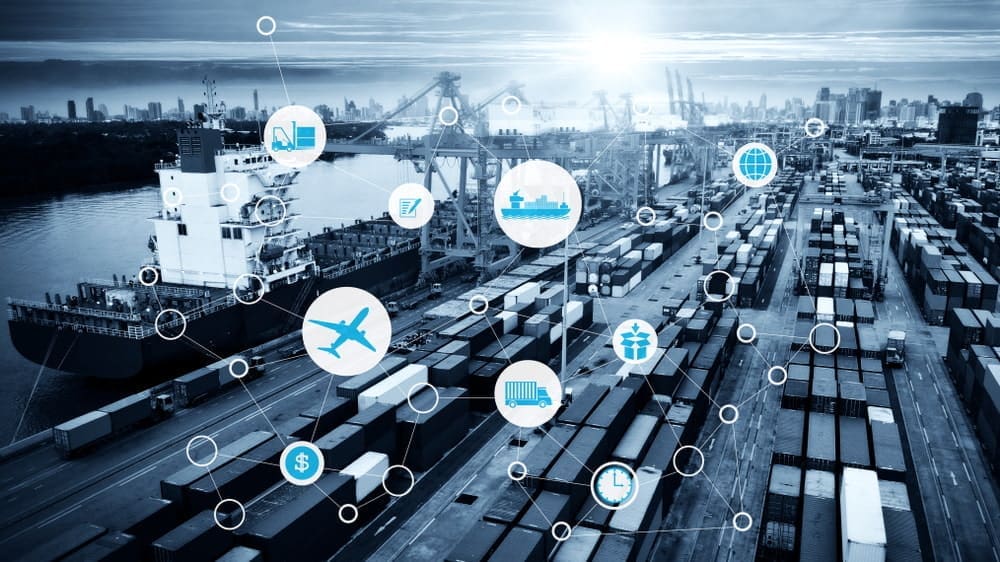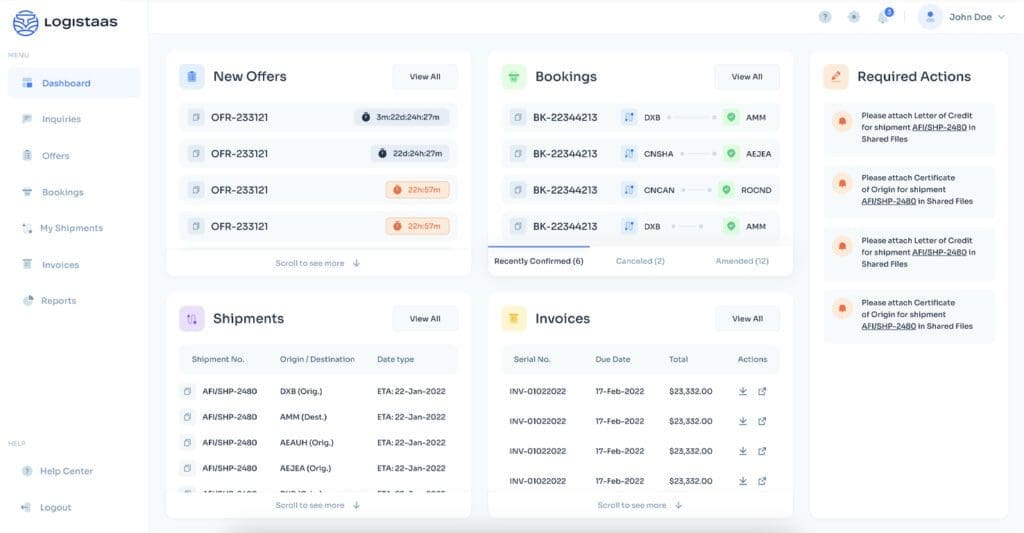Published Oct 2023
In the dynamic world of global commerce, the seamless movement of goods has never been more critical. At the heart of this intricate web of logistics lies the indispensable role of freight forwarders. These logistical maestros ensure that products journey from their point of origin to their final destination efficiently and reliably. However, in today’s fast-paced business environment, the freight forwarding industry faces unprecedented challenges and opportunities. This blog delves into the importance of embracing modern transportation management systems (TMS) in the freight forwarding sector, shedding light on how they can revolutionize operations in four key areas. Embark on this journey with us as we uncover the transformative power of transportation management systems for freight forwarders in today’s rapidly evolving logistics landscape.
Section 1: The Digital Revolution in the Freight Industry
In an era characterized by relentless technological advancement, the freight and logistics industry finds itself amid a profound digital transformation. The traditional methods of managing freight operations, laden with paperwork, phone calls, and manual coordination, are giving way to a new paradigm of efficiency and precision. This section unravels the ongoing digitization trend within the freight and logistics sector and underscores why it’s imperative for freight forwarders to wholeheartedly embrace this digital evolution.
Embracing the Digital Wave
The freight industry is no stranger to innovation, with each era witnessing its own set of advancements. However, the current wave of digitization represents a seismic shift, fundamentally altering how goods are transported, tracked, and managed. At the core of this transformation lies the convergence of cutting-edge technology and logistical expertise.
Why Digitization is Crucial for Freight Forwarders

- Efficiency Redefined: In the fast-paced world of logistics, every moment counts. Digitization streamlines processes, reducing the time required for tasks such as order management, documentation, and tracking. Freight forwarders armed with digital tools can swiftly adapt to changing circumstances, ensuring that shipments move seamlessly.
- Transparency as Standard: Transparency is no longer a luxury but an expectation in the logistics industry. Digitization brings real-time visibility, allowing all stakeholders, from shippers to end customers, to track shipments, monitor progress, and anticipate potential hiccups. This transparency builds trust and accountability.
- Competitive Edge: In a fiercely competitive market, those who harness digital tools gain a decisive edge. The ability to offer efficient, transparent, and cost-effective services not only attracts new customers but also retains existing ones. Forwarders who resist digitization risk being left behind in an increasingly digital landscape.
Section 2: The Role of a Transportation Management System (TMS)

In the ever-evolving landscape of logistics, a key enabler of the ongoing digital revolution is the Transportation Management System, often abbreviated as TMS. This section is dedicated to shedding light on the significance of TMS in the context of digitization within the freight forwarding industry.
Defining a Transportation Management System (TMS)
At its core, a Transportation Management System, or TMS, is a comprehensive software solution engineered to streamline and enhance the management of transportation operations within the logistics domain. Acting as the digital nerve center of freight operations, TMS is designed to equip logistics professionals with the tools and capabilities essential for efficiently planning, executing, and optimizing the movement of goods from one point to another.
Driving Digital Transformation in Logistics
One of the defining roles of a TMS is its function as a catalyst for digitization in the logistics sector. Here’s how a TMS propels the digital transformation:
- Automation Hub: TMS serves as an automation hub, reducing the reliance on manual processes that are prone to errors and delays. It automates various critical tasks, including shipment tracking, documentation generation, and compliance checks. By doing so, it elevates operational efficiency to unprecedented levels.
- Digital Collaboration: TMS facilitates digital collaboration among stakeholders within the logistics chain. Whether it’s communicating with carriers, agents, or customers, TMS creates a digital ecosystem where information flows seamlessly, reducing communication gaps and misunderstandings.
- Data-Driven Decision-Making: In a world where data is king, TMS software empowers logistics professionals with data-driven insights. Analyzing historical data and real-time information enables informed decisions regarding route optimization, capacity allocation, and demand forecasting.
For more information about what a transportation management system is, check this blog.
Benefits of Digitization
The advantages of embracing digitization in the freight industry extend far and wide. From enhanced efficiency to improved compliance, there is much to gain from investing in a TMS. As we navigate this digital revolution in the freight industry, it becomes evident that embracing technology is not an option but a necessity. To learn more in detail about the benefits of TMS check out our blog What are the Benefits of a Transportation Management System?.
Section 3: How a TMS Helps with Internal Operations and Collaboration with Subcontractors and Agents
In the fast-paced world of freight forwarding, where time is money and efficiency is paramount, internal operations and external collaborations can often become challenging to manage. By employing a TMS you can streamline both internal and external collaboration by:
- Efficient Order Management: TMS simplifies and automates order management. This streamlines the order-to-shipment process, enhancing order accuracy and expediting shipping.
- Data Management: TMS handles vast amounts of data with ease, automating data input, storage, and retrieval. This reduces the risk of errors associated with manual data management, resulting in a more efficient and accurate system.
- Enhanced Communication: Serving as a centralized communication hub, TMS ensures internal and external collaboration happens seamlessly. Information flows effortlessly, minimizing misunderstandings and communication gaps that can lead to costly errors.
- Compliance Made Easy: TMS simplifies compliance with customs regulations by automating the validation of shipments against various requirements. This feature ensures that freight forwarders avoid costly delays and penalties, enhancing their reputation for reliability.
- Document Sharing: Collaboration often involves sharing critical documents related to shipments. TMS offers secure document management capabilities, allowing freight forwarders to upload and share documents with subcontractors and agents. This not only streamlines documentation processes but also ensures data security and compliance.
In essence, a TMS revolutionizes both internal operations and collaboration by reducing complexity, increasing efficiency, and minimizing the risk of errors. It empowers freight forwarders to tackle their internal and external challenges with confidence, allowing them to focus on what matters most—delivering exceptional service to their customers and partners.
Section 4: Enhancing Customer Experience with a Customer Portal

In the competitive world of freight forwarding, customer-centricity has become a hallmark of success. Freight forwarders are increasingly recognizing that exceptional customer service is not merely a differentiator; it’s a necessity. In this section, we will discuss the importance of prioritizing customers in the freight forwarding industry and explore how a Transportation Management System (TMS) equipped with a customer portal revolutionizes the customer experience.
The Importance of Customer-Centricity
The freight forwarding industry is inherently customer-driven. Shippers and consignees expect reliable, efficient, and transparent logistics services. Meeting these expectations is paramount to retaining clients and fostering long-term partnerships. Here are key reasons why customer-centricity is crucial:
Competitive Edge: In a crowded marketplace, freight forwarders that excel in customer service gain a competitive edge. Satisfied customers are more likely to stay loyal and recommend services to others.
Repeat Business: Freight forwarding often involves recurring shipments. Providing an excellent customer experience ensures repeat business and consistent revenue streams.
Word of Mouth: Reputation matters. Positive experiences prompt clients to share their satisfaction with others, contributing to a freight forwarder’s reputation and credibility.
Differentiation: Exceptional customer service distinguishes a freight forwarder from its competitors. It’s a tangible way to stand out in a crowded field.
The Power of a Customer Portal
A TMS equipped with a customer portal is a game-changer in enhancing the customer experience. Here’s how it makes a difference:
Streamlined Communication: Customer Portals serve as a centralized platform where clients can submit inquiries, bookings, and shipping instructions seamlessly. This eliminates the need for back-and-forth emails and phone calls, streamlining communication and reducing the risk of miscommunication.
Real-Time Access: One of the most significant advantages of Customer Portals is the ability to provide clients with real-time access to essential information. Clients can track the status of their shipments, view offers, and access invoices, all in real-time. This transparency enhances trust and confidence in the logistics provider’s services.
Customization: Customer Portals often come equipped with features that allow clients to customize documents and reports to their specific requirements. This level of personalization not only adds convenience but also showcases the logistics provider’s commitment to meeting the unique needs of each client.
Accessibility: Unlike traditional communication methods that operate within office hours, Customer Portals are accessible 24/7. This means that clients can interact with logistics services at their convenience, making it easier to do business across different time zones.
Global Reach: In an increasingly globalized world, logistics providers need to cater to clients with international operations. Customer Portals are designed to support global reach, making it easier for clients to expand their businesses into new markets while receiving the local support they need.
Enhanced Security: Security is a top concern in the logistics industry due to the sensitive nature of shipment data. Customer Portals offer a secure environment for data exchange, reducing the risk of data breaches and ensuring the confidentiality of client information.
A TMS equipped with a customer portal is a powerful tool for freight forwarders looking to elevate the customer experience. By offering clients real-time visibility and convenient communication, freight forwarders can strengthen client relationships, build loyalty, and establish themselves as trusted partners in the logistics journey.
Section 5: Why Choose Logistaas as Your TMS
Are you ready to push your freight forwarding business into the digital age? Look no further than Logistaas, your ultimate partner in efficiency and innovation.
Logistaas: Your Path to a Digital Future
Logistaas isn’t just a Transportation Management System (TMS); it’s the driving force behind the digital transformation of freight forwarders worldwide. Our mission is simple: to help you streamline operations, scale your business, and thrive in an era defined by technology-driven, integrated supply chains.
Here’s why you should consider Logistaas as your trusted TMS partner:
1. Affordability Without Compromise

We understand that cost-effectiveness is crucial in the logistics industry. That’s why Logistaas offers competitive pricing, starting at just $55 per user per month. Our pricing model ensures that businesses of all sizes, from startups to industry giants, can access cutting-edge logistics solutions without breaking the bank.
2. Comprehensive Functionality
Logistaas is more than a TMS; it’s a comprehensive logistics solution. Our platform covers every aspect of your freight forwarding operations. Here are some key features that set Logistaas apart:
Operations Management: Logistaas streamlines your operations, allowing you to effortlessly manage air, sea, land, customs clearance, inbound, outbound, domestic, cross-trade, consolidated, transshipment, and multimodal shipments. We offer seamless integration with numerous platforms, enabling smooth communication with airlines and shipping lines.
Finance Management: Our finance management module ensures you can efficiently handle accounts receivables and payables. We’re also developing a comprehensive accounting module coming soon.
Sales and Pricing Management: With Logistaas, you gain a powerful tool to manage your sales process. Our CRM module is designed specifically for shipping and freight forwarding, supporting sales, pricing, and quotation processes.
Customer Portal: Deliver an exceptional customer experience with our intuitive portal. Customers access real-time data, make bookings, track shipments, and manage their logistics needs seamlessly. Customize the portal to meet each client’s unique requirements.
3. User-Friendly Experience
Logistaas is designed with user-friendliness in mind, reducing the learning curve for your employees. Our intuitive interface ensures that your team can harness the platform’s full potential from day one. We also offer training resources and support to make the transition even smoother.
4. Global Accessibility

In today’s interconnected world, global reach is essential. Logistaas offers 24/7 accessibility and
global compatibility, allowing you to serve clients across different time zones and regions.
Whether you’re a local freight forwarder or a global logistics provider, Logistaas adapts to your
requirements.
When it comes to choosing a TMS, Logistaas is the clear choice for those who seek efficiency,
affordability, and innovation. Join the growing community of logistics businesses that trust
Logistaas for cost-effective, feature-rich TMS solutions. Start optimizing your freight forwarding
operations today and secure your position as a leader in the dynamic world of logistics.
Schedule a free demo and experience the difference for yourself.
In conclusion, the world of freight forwarding is evolving rapidly, and embracing digitization is no longer an option but a necessity. This blog has shed light on the crucial role of Transportation Management Systems (TMS) in this digital transformation journey.
Embracing digitization and implementing a TMS are no longer just business strategies; they are imperatives for success in the modern freight forwarding landscape. It’s time for freight forwarders to join the digital revolution, streamline their operations, and stay ahead of the competition.
As you embark on this transformative journey, we encourage you to consider Logistaas as your trusted TMS partner. With Logistaas, you gain not only a cost-effective solution but also a pathway to innovation and efficiency. Start your digital transformation today with a free demo of Logistaas and experience the future of freight forwarding. The choice is clear – Logistaas: Your Partner in Efficiency and Innovation.

